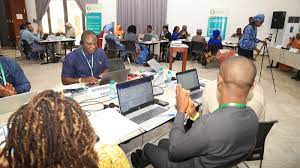APA – Lagos (Nigeria)
A workshop for gender experts, focal persons of the ECOWAS Gender Development Centre from the 15 ECOWAS Member States, has commenced on Monday, April 3, 2023, in Saly-Mbour, a town 80km from Dakar, Senegal.
The main aim of the workshop, holding from 3rd to 5th April 2023, is to evaluate the role and performance of the gender focal points and to identify ways to build capacity to enhance their performance in supporting the implementation of EGDC programmes in Member States under ECOWAS Vision 2050.
The workshop was officially declared open by Prof Fatou Sow Sarr, ECOWAS Commissioner for Human Development and Social Affairs.
In more specific terms, the workshop aims to facilitate an update of the database of Gender Focal Points and a multiyear planning of programmes, projects and activities of the EGDC to be carried out in the Member States.
Furthermore, the workshop affords an opportunity to introduce the content of ECOGO (Ecowas Gender Observatory), which is an information sharing and awareness creation platform.
It is being funded by the United Nations Development Programme, UNDP, and aims to strategically position the EGDC as an agency of reference responsible for implementing ECOWAS Gender Policy.
Besides the Gender Focal Points from Member States, representatives of ECOWAS Institutions, Specialised Agencies and Directorates, Civil Society Organisations and technical partners such as UN-Women, UNDP, United Nations Population Fund, UNFPA, Spanish Cooperation, are also taking part in this workshop.
After welcoming the participants, Stephan S. Sambou, Head of the ECOWAS National Office in Senegal emphasized the importance of gender for key sectors of ECOWAS such as trade, free movement of persons and goods, political and social activities, socio economic development programmes, etc.
In her keynote address, delivered on behalf of Sandra Oulate Fattoh, Director of the EGDC, Salimata Thiam, the Principal Programme Officer, Gender, gave a brief history of the ECOWAS Gender Centre.
She also recalled that “The main purpose of EGDC’s Gender Focal Points is to get closer to stakeholders in the Member States and to create the appropriate framework for executing the centre’s mandate in the context of the new ECOWAS Vision 2050…To follow up on the adoption of its new 2023-2027 Strategic Plan, the EGDC has deemed it necessary to reconnect with the Gender Focal Points to share new programme implementation strategies.
Subsequently, representatives of technical partners, notably Spanish Cooperation and UN-Women, delivered their respective solidarity messages. Speaking, Javier Vega, Coordinator for Spanish Cooperation, Senegal emphasized his country’s choice to orient and anchor its feminist policy on the AU 2063 Agenda and on MDG 5 (gender equality and empowerment), before reaffirming his institution’s commitment to pursue cooperation with ECOWAS and the EGDC.
Earlier, Prof Fatou Sow Sarr, ECOWAS Commissioner for Human Development and Social Affairs, who declared the workshop open pointed out that ECOWAS had very early on affirmed its commitment to the global agenda promoting gender equality and women empowerment.
“We have in each of our Member States, national gender development mechanisms, Gender Focal Points, women and youth groups and organisations extremely committed to the fight against social inequalities and to strengthening women leadership in politics, the economy and society. It is therefore in a bid to further harness the various contributions of all actors that ECOWAS Department of Human Development and Social Affairs, through the EGDC, has initiated this framework for sharing and consultation”.
The ECOWAS Gender Development Centre, EGDC, was established in 2003 by the ECOWAS Authority of Heads of State and Government. It was established as a Specialised Agency of the Economic Community of West African States (ECOWAS) responsible for initiating and facilitating capacity building through knowledge-based training and skills transfer, development and management of programs for women and men in the public and private sectors to address gender equality and women and girl-child empowerment in ECOWAS integration programmes.
From inception, the Centre has developed technical and financial assistance programmes for women, men, the youth and children including: the Scholarship Programme, Support Programme for Women and Girls suffering from Obstetric Fistula, Support Programme for Women Processors of Agricultural, Fishery and Handicraft Products, Support Programme for Civil Society Organisations involved in gender development (notably REPSFECO and ROAJELF), Support Project for the Protection of Children Victims of Rights Violations (PAPEV) in six Member States, the “50 Million Women Speak” Project, etc.
GIK/APA


